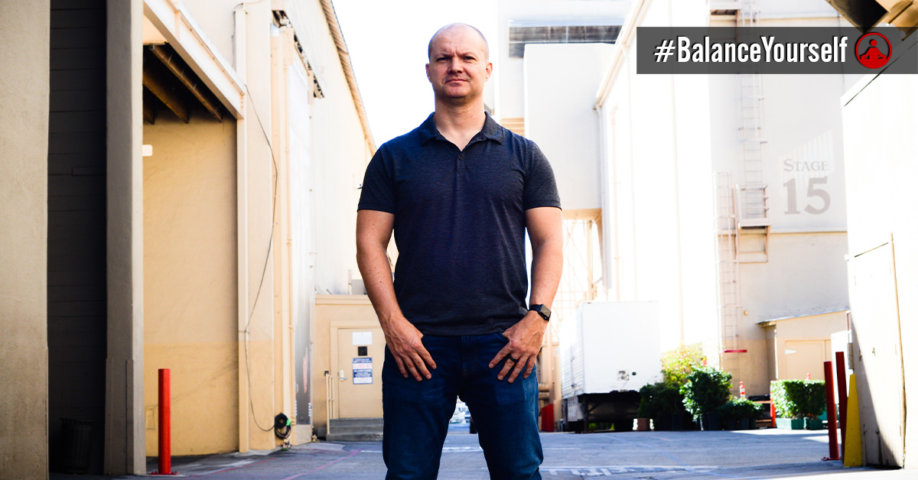Featured image credit: Michelle Alizabeth Blake
Author’s Note: The following is just one in a series of my impassioned letters to the entertainment industry titled “Dear Hollywood” that I’ve written over the last several years that examines and questions how we fundamentally live and work in this business.
When I published my article Dear Hollywood: We Don’t Want to ‘Go Back to Normal.’ Normal Wasn’t Working I was absolutely floored by the response as I watched it spread like wildfire across social media in all sectors of the entertainment industry. I honestly never thought this message would ever reach beyond my tiny little (windowless) corner of the post-production world.
From 2nd assistant directors in Mexico City to makeup artists in North Carolina to corporate video editors in Germany to accountants in Japan, not to mention countless directors, producers, and even actors (Skinny Pete, yo!), I’ve heard from people on all six continents. From marketing to features to advertising to television to documentary, above-the-line and below-the-line, union and non-union alike – the idea of nobody wanting to go back to ’Normal’ clearly struck a nerve.
Once again, Hollywood…sorry not sorry.
As I said in my interview with Cathy Repola, National Executive Director of the Motion Picture Editors Guild (Local #700):
This is not just a union issue. This is a human issue.
We all seem to be in universal agreement the way we did things pre-pandemic in the entertainment industry wasn’t working. Since sharing my own list of what I believed wasn’t working, I’ve received hundreds of messages and included many of your personal stories about what hasn’t been working in your lives. (Here’s the full list of the personal stories people have shared with me anonymously).
There are countless important issues unique to people’s circumstances that clearly need to be addressed. But regardless of age, gender, race, ethnicity, sexual orientation, socioeconomic status or otherwise, there is one fundamental core issue driving the vast majority of the problems in the entertainment industry that needs to be addressed now: The hours we work.
Time is the ultimate equalizer. We all have the same 24 hours a day and 7 days per week. And we all universally agree we don’t have enough time to do our jobs properly without sacrificing our relationships, our health, or our sanity in the process (not to mention those who have literally given their lives for the sake of entertainment).
Hollywood, it’s time for a much-needed (and overdue) intervention.
As I stated in my previous article, for the first time in cinema history we’re no longer “building the plane while flying it,” the plane is in the hangar and we have the opportunity to make significant upgrades. And where we need to start is rewiring the expectations of how many hours per week it really takes to create entertainment (Reminder: We’re not curing cancer).
I believe that not only CAN we find a solution to make 45 hours the new standard workweek in Hollywood, but also because of Covid-19 we no longer have any choice; we MUST make 45 hours the new standard.
Both our livelihoods and our lives literally depend on it.
Click here to sign the Change.org petition to support a 45-hr week in Hollywood
Why a 45 hour Week In Hollywood CAN Work
Before arguing that we must abolish the “standard” 12 hour day (that inevitably creeps into 16-20 hrs) and establish a 45 hour week in Hollywood, we must first address the question:
Is a 45 hour week in Hollywood even possible?
When I posed this question on Facebook I received a variety of perspectives.




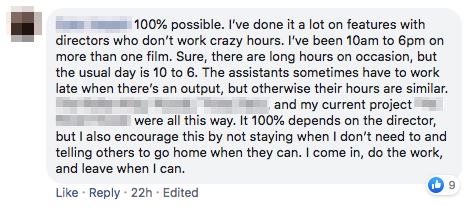
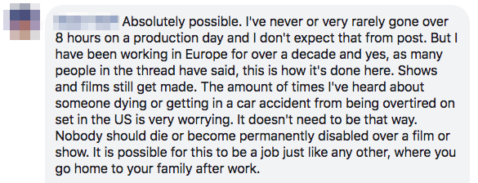
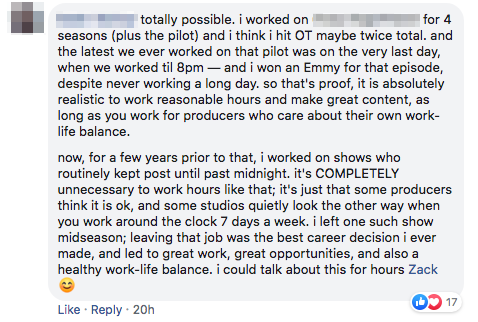


While the perspectives vary in the details, it seems abundantly clear that a 45 hour week is absolutely possible. We’ve simply been conditioned to believe otherwise. The assumption is if we speak up, we become “the difficult one” and risk losing our job (or even worse – we are blacklisted). But at this point,
I’d rather risk my job than my life.

Working 40-45 hours per week is actually already the norm in much of the entertainment industry outside of the ‘studio system’, including a decent portion of the non-scripted world, largely in the corporate world, and even in the scripted world in many European countries. (They call them “French Hours” for a reason)
And hell, if it’s good enough for the Coen brothers who do it in 50, or Clint Eastwood who’s well known for shooting eight-hour days, meeting his deadlines, and coming in UNDER budget, it should be good enough for all of us.
Finally, for the bean counters still not convinced a 45 hour week is possible – if you are freaking out about extended schedules that lead to inflated budgets, rentals, and salaries – get this: Line producers have proven shorter days are actually cheaper!
Back in 2012, veteran line producer Robert Schneider (who creates shooting schedules and budget for clients such as Tim Robbins, Spike Lee, and David Fincher) budgeted a $40 million below-the-line studio feature film based on the usual 12-hour shooting day (which inevitably becomes 16+ hrs), but then he re-budgeted the same film based on an 8-hr day1.
The new budget with shorter work days came in 1 million dollars cheaper.
This isn’t magic, it’s math.

According to Schneider:
I wanted to dispel the notion that working shorter, more humane hours means increased costs. I’ve suspected for a long time that on many films, it’s cheaper and more efficient to shoot basically straight-time days than to shoot extended hours that are inefficient and paid for at premium rates.
Schneider’s wife and first assistant director Yudi Bennett adds:
The key to shorter working hours is changing a mindset. People are creatures of habit, and we do what we’ve always done until we stop and think about it and say, ‘There’s got to be a better way.’
Whether people want to believe it or not, abundant evidence exists that proves a 45 hour week in Hollywood is absolutely possible.
Where it gets complicated is how we do it.
What about my pension contributions and my “golden time”?
Do you expect me to work less hours for the same hourly rate? No way!
What about those who argue “We’re just lucky to have jobs! Shut up and be grateful for what you already have.”
And what about the workaholics who perpetuate the “Sleep Deprivation Badge of Honor” cult of work that shames those of us who “can’t hack it?”
Yes, this is a complicated issue with a multitude of angles and perspectives, all of which need to be examined. Every voice in this discussion matters. And I don’t propose to have all the answers that lead us to the finish line.
But I do know where we need to start.
Rewriting Hollywood’s “Code” From Scratch
In the world of software development there’s a term called “Legacy code” which is source code that relates to a no-longer-supported operating system or specific technology (To my editor friends: Think the ‘Avid Title Tool’ from 1990).
For decades Hollywood has been writing bad code on top of bad code on top of bad code to maintain a legacy that no longer needs to exist…and like outdated software, it’s causing the entire system to crash over and over again.
Literally.
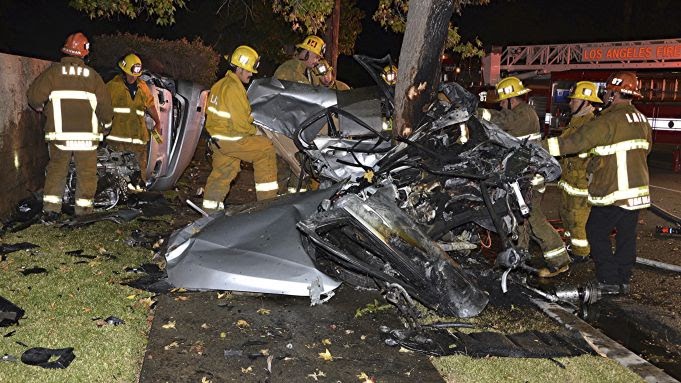
A photo of the aftermath of a crash involving Riverdale actor KJ Apa who was “drowsy driving” after a long day of shooting in 20172
The “legacy code” baked into Hollywood is as follows:
Worker compensation = Hourly wage x Hours worked
Since the advent of “punching the time clock” in the 1880’s during the Industrial Revolution we’ve equated our compensation based on the hours we work as if we’re just tiny cogs that are part of a much larger machine.
It’s time to embrace the 21st century way of working where output reigns supreme over hours worked.
It’s time to embrace the idea that for those of us who are “knowledge workers” (editors, writers, producers, composers, sound designers, visual fx artists, etc etc etc, and essentially every creative craft in production not beholden to the shooting day), we are paid for our creativity, our ability to solve complex problems, and our ability to generate ideas – it is not our responsibility to look “busy” chained to our desks for an arbitrary number of hours per day specified by a structure originally conceived a century ago.
If the expectation is that the work assigned to us between any given Monday to Friday should take 45 hours, yet we finish in 40 hours because we’re more effective with our time, we should be rewarded, not punished with more busy work or expected to “put in our 60.” And if despite being as effective with our time as possible we’re still unable to meet an unrealistic deadline, we should either be paid overtime for every hour above forty-five, or preferably have our deadline extended.
In this scenario:
We are not the problem – your lack of planning is the problem.
At this point I can only assume a studio executive or line producer is seeing an opportunity to save some cash.
You want a 45-hr week? Fine! You got it. But that’s less cash in your pocket over the course of the project and more in ours.
Nope. Not so fast.
In the 21st century model where output reigns supreme over the number of hours worked, the pay we would have received for a ‘standard’ 5-day (i.e. 60 hour) week is exactly what we will receive for 45 hours. You’re getting the same product, therefore we receive the same compensation.
And if that week takes more than 45 hours? You’re gonna need more weeks. Or you’ll need to pay us OT and “golden time” accordingly starting at 45, not 60.
The reason I stand by this model is because it means we all have the responsibility to figure this out together. Everyone has to pull their weight if we’re going to come out of this pandemic on the other end without losing lives due to negligence.
If studios and producers are willing to entertain the notion of shorter work weeks for the same compensation, it’s our turn as “creatives” to step up to the plate and deliver. That means both time management and ‘Deep Work’ are now 21st century skills we must prioritize, learn, and perfect. This is no different than honing our ability to tell compelling stories or manage complex software programs.
As Cal Newport, the author of ‘Deep Work’ talked about in our podcast interview:
The ability to perform deep work is becoming increasingly rare at exactly the same time it is becoming increasingly valuable in our economy. As a consequence, the few who cultivate this skill, and then make it the core of their working life, will thrive.
This means spending less time in our email inboxes and scrolling Facebook or Instagram and more time putting in the deep work necessary to deliver amazing creative work on time and within budget.
This means learning more effective communication skills and remote project management workflows to adapt to the 21st century virtual world we’re living in today (e.g. Slack, Trello, Frame.io, Evercast, etc).
This means taking responsibility for all of the unpaid nights and weekends we’re clocking (or spending on the couch) because we’re afraid of “being the difficult one” and instead advocating for ourselves and our team members so everyone can better understand why the current schedule isn’t working and needs to be fixed.
This is on all of us.
If we insist on change, we have to be willing to give just as much as we take. The alternative is the status quo, and it seems we’re all in universal agreement at this point – the status quo is no longer an alternative.
How to Shoot in 45 What Used to Take 60 (or more) Using “The Mother-In-Law Principle”
All of this “getting paid for output instead of hours worked” funny business sure sounds wonderful for everyone lucky enough to have the luxury of sitting behind desks all day long…but what about the workers on the front lines beholden to the shooting schedules whose lives are dictated by call sheets and the neverending roll of digital cameras? How do you judge a dolly grip, a set dresser, an electrician, an AD, or a camera loader by output instead of hours worked?
Unfortunately you can’t.
But what shortening the standard shooting day to 9 instead of 12 hours forces everyone to do is innovate.
More money and more time does not automatically equal a better end product, and the converse is equally as true. Some of the best films and television shows in the history of cinema came to be because they were forced to innovate due to lack of funding, lack of locations, lack of lighting, or whatever. I promise you that writers, directors, producers, studio executives, and all department heads will be willing to innovate and reevaluate their way of doing things if in return they get a portion of their lives back.
There is a popularized term in the productivity world called ‘Parkinson’s Law’ that (to loosely paraphrase) states the following3:
The work expands or contracts to fit in the time we allow it.
To simplify a bit, this means that the amount of time we have to perform a task is the amount of time it takes to complete the task.
Scheduled 12 hours to shoot? It will take 12 hours to complete the day’s shoot.
Scheduled 12 hours to shoot knowing you can afford to pay 4 extra hours of OT? It will take 16 hours to complete the day’s shoot.
Scheduled 9 hours knowing that you have no option to extend the schedule because increased work hours puts the health & livelihood of everyone on set at risk? It will take 9 hours to complete the day’s shoot.
Because I’ve found “Parkinson’s Law” to be a bit stiff and complex to understand, I’ve taken the liberty of modifying the name to make it easier to comprehend.
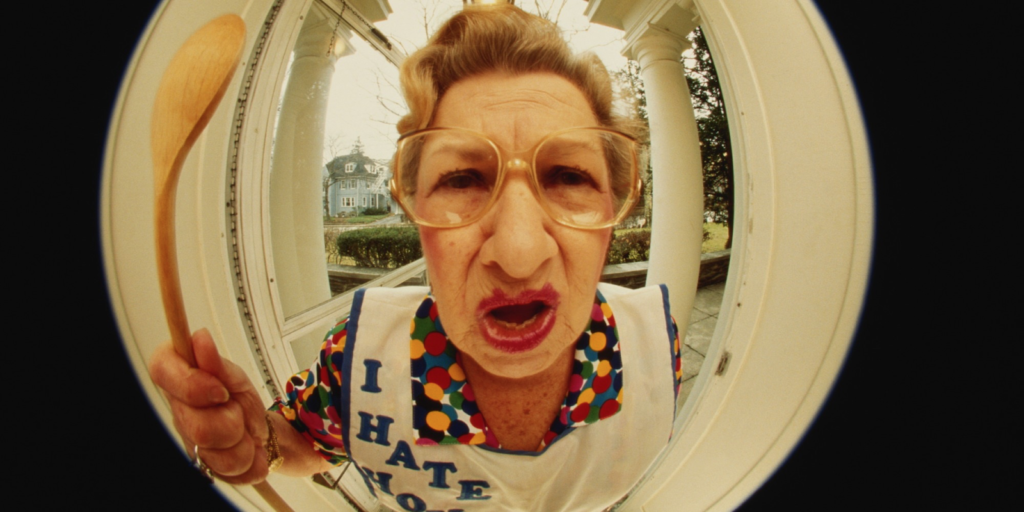
What I have deemed “The Mother-In-Law Principle” states:
No matter how long it may take you to clean your house on a regular basis, if your Mother-In-Law is making a surprise visit in 4 hours, it will take exactly 3 hours and 59 minutes to clean your house.
If the shooting day shifts from twelve to nine hours (a decrease of 25%), this will absolutely mean less pages shot per day and thus more total shooting days, but I’d bet good money the average number of pages per day over time would decrease by far less than 25% as everyone works together to innovate new ways to schedule and shoot scenes more efficiently.
Lastly, because production is upstream from every other department in the Hollywood pipeline, shorter shooting days leads to less dailies which leads to less demands on post-production on a daily basis which then trickles down to savings in sound, music, color, and all of the other departments who before were always given the shaft (to put it lightly) at the tail-end of already-ridiculous delivery schedules.
A 45 hour week can be done, we just have to be willing to unite between crafts, guilds, vendors, union and non-union alike, to innovate our way into the 21st century. And most importantly, this only happens when we begin to advocate for ourselves and set boundaries.
At this point we frankly have no other choice.
Why a 45-hr Week in Hollywood MUST Work
I don’t think scientific research is necessary to prove how detrimental chronically working insane hours is to our health, our well-being, and our sanity. Nobody ever woke up at noon on ‘Fraturday’ after an 80 hour week and proclaimed, “Man, I feel great! All that hard work this week has done me good.”
However…I’m gonna throw scientific research at you anyways (sorry, I know “science” isn’t really in vogue right now, but I still believe in it) because clearly this industry has yet to grasp the severity of our circumstances. No matter if you’re a craftsperson or a studio executive, whether you’re above-the-line or below-the-line, people getting sick means work stops which means nobody gets paid and we all stay home until we figure this out.
Oh boy…where to begin.
How about the fact that if this industry continues to chronically deprive all of us of sleep it will ravage our immune systems4 such that we’re more susceptible to Covid-19 and thus more susceptible to being dead?
According to a 2017 study conducted by the University of Washington Health Sciences where scientists compared the immune systems of identical twins with different sleep patterns5:
When sleep deprived people are given a vaccine, there is a lower antibody response, and if you expose sleep deprived people to a rhinovirus they are more likely to get the virus. This study provides further evidence of sleep to overall health and well-being particularly to immune health…Seven or more hours of sleep is recommended for optimal health.
Seven hours?!?! Yeah right.
We only have twenty four hours in any given day, and when it’s culturally acceptable for the “standard” workday to be 12 hours (and let’s be honest, it’s NEVER just 12), and you include commuting, family time, appointments, and otherwise, seven hours of sleep is mathematically IMPOSSIBLE.
But let’s assume at this point you’re a unique snowflake who can “get by on four or five hours a night” and you just want to get back to work. Do you care at all about leaving your family without a husband, a wife, a partner, a dad, a mom, a son, a daughter, or otherwise at some point down the road? Because a weakened immune system, while clearly the most pressing issue at the moment, is the tip of the iceberg when it comes to not getting enough sleep.
There is nothing more detrimental to your health & well-being than lack of sleep. Chronic sleep deprivation over time can lead to a myriad of stress-induced conditions, disorders, and diseases, not to mention increased anxiety, depression, and a host of other mental health issues.
Even worse, specifically for those who work late nights, as I discovered in my podcast interview with sleep expert Shawn Stevenson:
The International Agency for Research on Cancer has classified overnight shift work as a Group 2A carcinogen.
You read that right…all of those late night call times, the ‘Fraturdays,’ and the sleepless nights in the edit bay literally cause cancer. It’s no coincidence it’s called “The Graveyard Shift.”
For those who could care less about what “might happen” someday if you don’t get enough sleep, let’s instead consider the immediate ramifications of sleep deprivation to your creativity and ability to solve complex problems (i.e. your entire job).
In my podcast with former Navy Seal & physician Dr. Kirk Parsley we discuss the cognitive damage of sleep deprivation. As he states in his book Sleep to Win:
Depriving oneself of approximately 2 hours of sleep leads to a performance decline on par with a blood alcohol level of .05 percent. However, if this person is sleep deprived 2 hours per night for 11 nights in a row, their performance decline is on par with a blood alcohol level of approximately .08 to .1 percent.
In short…if you don’t get enough sleep, you are showing up to work cognitively drunk every single day.
If someone showed up to work smelling of alcohol, would we celebrate them? Of course not, we’d pull them aside knowing they are potentially a danger to themselves and others. Yet we celebrate and champion those who can “suck it up” and work through the long hours.
I could go on about about how sleep deprivation and chronic overwork are dangerous, but here are a few additional bullet points to consider:
- Working “long hours” (defined as ‘working 10 hours at least 50 days per year’) increases your risk of having a stroke by up to 45%. And the association is stronger for people under the age of 506. (i.e. strokes aren’t just for your grandpappy anymore).
- Chronically working long hours can literally lead to death as it did for Miwa Sado, age 31, after logging 159 hours of overtime in a month. This is such a prevalent issue in Japan, for example, they even have a word for it: Karoshi7.
- The cost of mental health issues alone is astronomical. A recent study estimated that the cost of mental health issues to the UK’s entertainment sector was more than $300 million annually. As it says in this article, Hollywood’s Mental Health Reckoning Has Arrived.
And everything mentioned above? Pre-pandemic.
None of this should be news. Sleep deprivation was an epidemic in Hollywood for decades BEFORE the pandemic, so much so that multiple industry committees have been formed to talk about the dangerous work hours, the deaths by falling asleep at the wheel, and otherwise. Legendary Director of Photography Haskell Wexler even created a documentary on the subject called Who Needs Sleep? Unfortunately the desperate change Haskell and so many others have fought for the last few decades has not come to fruition…yet.
But things are different now. Covid-19 not only changes the game, we’re playing on a completely different field.
Imagine if we shunned people who didn’t get a good night’s sleep and showed up exhausted to work every day the way we are currently shunning people for not wearing their masks? The entire Hollywood system would need to change to meet the new cultural expectation that sleep and well-being are vital to our ability to produce entertainment, not to mention necessary to survive this pandemic. Reverse engineer from this one goal alone and we work in a completely different world.
Who else is ready to proudly wear their “I Got 7 Hours Last Night!” badge of honor along with me?
Hollywood, It’s Time For a New ‘Legacy’
Arguing for more sleep and more downtime is not a sign of weakness, there is not something wrong with us because we have priorities outside our jobs. We are human. We can all continue to be successful and create amazing content together because we prioritize sleep, our health, and our sanity, not despite the fact that we prioritize all of the above.
Hollywood, we have an immense opportunity to redefine our legacy. The studio system as we know it was literally born from the Spanish Flu of 19188.
Hollywood, what do we want our legacy to be after Covid-19?
Option #1: We suffer a string of unnecessary infections (and potentially deaths) and multiple work shutdowns because we chose to get back to work too fast?
Option #2: We design and embrace a new, more sustainable way of working for decades to come because we chose to do this right?
If you want to make Option #2 a reality, take action and support the petition below to make a 45-hr week in Hollywood our new reality.
Take Action
As Ghandi famously said, “Be the change you want to see happen.” It begins with you.
- Click to sign the petition below.
- Leave a comment expressing how your life would improve if you regularly worked a 45 hour week.
- Share this post and tag me! » Here’s my Facebook page, Instagram profile, LinkedIn profile, and Reddit profile.
Click here to sign the Change.org petition to support a 45-hr week in Hollywood

